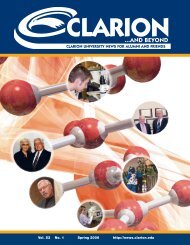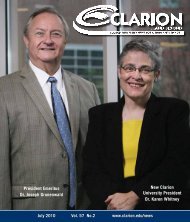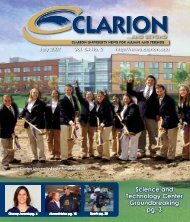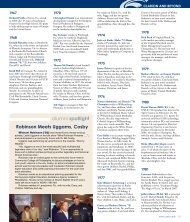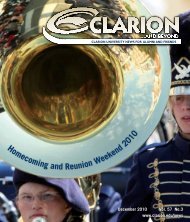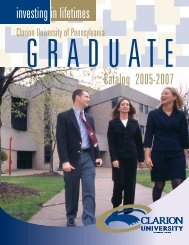Graduate - Clarion University
Graduate - Clarion University
Graduate - Clarion University
- No tags were found...
Create successful ePaper yourself
Turn your PDF publications into a flip-book with our unique Google optimized e-Paper software.
<strong>Clarion</strong> <strong>University</strong> of Pennsylvania 85Master of Science inSpecial EducationThe special education master’s degree program isdesigned primarily for students whose career interestsare in special education services and programs withineducational agencies and institutions of higher education.Students who presently hold a Pennsylvania special educationteaching certificate take a core of 21 required graduatecredits and in addition pursue 12 credits individuallyselected by the student in consultation with their advisor.Students who presently hold a bachelor’s degree froman accredited program may pursue the master’s degreewhile completing additional course work leading toPennsylvania certification in the area of special education.The student’s advisor will individually determine thespecific course work for certification after a review of thestudent’s past course work and experience.Admission Requirements<strong>Clarion</strong> <strong>University</strong>’s general admission requirementsapply, with the following additions:• A baccalaureate degree from an acceptablyaccredited college or university• Undergraduate minimum quality-point averageis 3.0 or above (on a 4.0 scale)• Satisfactory scores for the <strong>Graduate</strong> RecordExam General Test or the Miller AnalogiesTest• T h r e e f a c u l t y a n d / o r p r o f e s s i o n a lrecommendations; recommendation formsshould document applicant’s potential and/oreffectiveness in the areas of teaching abilityand/or professional performance.Degree RequirementsIn addition to the general requirements of the Divisionof <strong>Graduate</strong> Studies at <strong>Clarion</strong> <strong>University</strong>, students shallmeet the following requirements:• Students must complete a planned program ofstudy approved by their advisors including aminimum of 33 credits.• Students contemplating more advancedstudies after completing the master’s degree orcontemplating careers that involve research mayelect, with the approval of their advisor, a thesisproject (SPED 600).The purpose of electives is to provide flexibilitywithin the program so students can further developtheir knowledge, skills, and expertise in individual areasof career interest and to enhance their career options. Thechoice of electives is, therefore, not limited to SPED orREHB courses. With the prior approval of the student’sadvisor, the student may choose elective courses fromother departments or institutions of higher education.Note: In accordance with <strong>Clarion</strong> <strong>University</strong> residencyrequirements, no more than a maximum of 30 percent ofthe total graduate credits may be transferred from otherinstitutions.M.S. in Special EducationRequired Core..................................................... 21 creditsED 520: Introduction to Research.........................3 s.h.SPED 500: Contemporary Issues inSpecial Education................................................3 s.h.SPED 520: Role Development with Parents..........3 s.h.SPED 532: Policy and Practice inSpecial Education ...............................................3 s.h.SPED 535: Advanced Methods for Individualswith Severe Handicaps.........................................3 s.h.orSPED 536: Advanced Methods for Individualswith Mild/Moderate Handicaps..........................3 s.h.SPED 567: Seminar in Advanced AppliedBehavior Analysis................................................3 s.h.SPED 580: Special Reading Instruction.................3 s.h.Electives .............................................................. 12 creditsSPED 505: Concepts of Intelligence......................3 s.h.SPED 514: Introduction to Gifted Education.......3 s.h.SPED 530: Learning Disabilities............................3 s.h.SPED 534: Workshop in Special Education............3 s.h.SPED 539: Curriculum Development and EducationalProgramming in Gifted Education.......................3 s.h.SPED 540: Behavior Disorders...............................3 s.h.SPED 562: Service Learning...................................3 s.h.SPED 585: Special Topics in Special Education....1-3 s.h.SPED 590: Special Projects....................................3 s.h.SPED 596: Contemporary Education Practicesand Directions......................................................3 s.h.SPED 597: Collaboration and Cooperation:Improved Teaching and Learning Outcomes.......3 s.h.SPED 600: Thesis.................................................3, 6 s.h.SPED 415: Instructional Development andStrategies for Mildly/ModeratelyHandicapped.........................................................3 s.h.SPED 420: Instructional Development andStrategies for Severely/ProfoundlyMulti-Handicapped..............................................3 s.h.REHB 405: Substance Abuse...................................3 s.h.REHB 410: Prevention and Treatment ofSubstance Abuse..................................................3 s.h.REHB 545: Rehabilitation: Philosophy andPrinciples..............................................................3 s.h.REHB 565: Seminar on Rehabilitative ServiceDelivery Systems.................................................3 s.h.REHB 580: Intervention Strategies inRehabilitative Sciences........................................3 s.h.REHB 586: Dual Diagnosis.....................................3 s.h.A maximum of six credits from the 400-level courseslisted above can be taken for graduate credit with specialpermission. Please note that 400-level courses taken forundergraduate credit cannot be repeated for graduatecredit.Certification RequirementsFor students already holding Pennsylvania InstructionalRehabilitative Sciences/Special Education



